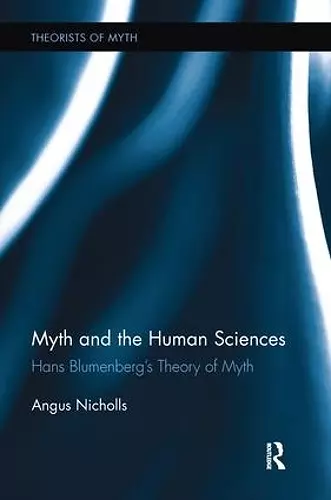Myth and the Human Sciences
Hans Blumenberg's Theory of Myth
Format:Paperback
Publisher:Taylor & Francis Ltd
Published:10th Nov '16
Currently unavailable, and unfortunately no date known when it will be back
This paperback is available in another edition too:
- Hardback£160.00(9780415885492)

This is the first book-length critical analysis in any language of Hans Blumenberg’s theory of myth. Blumenberg can be regarded as the most important German theorist of myth of the second half of the twentieth century, and his Work on Myth(1979) has resonated across disciplines ranging from literary theory, via philosophy, religious studies and anthropology, to the history and philosophy of science.
Nicholls introduces Anglophone readers to Blumenberg’s biography and to his philosophical contexts. He elucidates Blumenberg’s theory of myth by relating it to three important developments in late nineteenth- and early twentieth-century German philosophy (hermeneutics, phenomenology and philosophical anthropology), while also comparing Blumenberg’s ideas with those of other prominent theorists of myth such as Vico, Hume, Schelling, Max Müller, Frazer, Sorel, Freud, Cassirer, Heidegger, Horkheimer and Adorno. According to Nicholls, Blumenberg’s theory of myth can only be understood in relation to the ‘human sciences,’ since it emerges from a speculative hypothesis concerning the emergence of the earliest human beings. For Blumenberg, myth was originally a cultural adaptation that constituted the human attempt to deal with anxieties concerning the threatening forces of nature by anthropomorphizing those forces into mythic images.
In the final two chapters, Blumenberg’s theory of myth is placed within the post-war political context of West Germany. Through a consideration of Blumenberg’s exchanges with Carl Schmitt, as well as by analysing unpublished correspondence and parts of the original Work of Myth manuscript that Blumenberg held back from publication, Nicholls shows that Blumenberg’s theory of myth also amounted to a reckoning with the legacy of National Socialism.
'Nicholls has written not just the definitive study of Blumenberg as a theorist of myth, but also an excellent general introduction to this prolific yet mercurial thinker. His achievement is unrivalled in situating Blumenberg in the development of German thought and drawing persuasive connections between Blumenberg and his manifold influences and ancestors, acknowledged and not.' – Joe Paul Kroll, Leibniz Institute of European History, Mainz in Modern Language Review
'This book is a welcome addition to scholarship on Hans Blumenberg. It is clearly written and authoritative. It will introduce the thinking of Blumenberg to a wider audience, and acquaint readers with aspects of the intellectual context Blumenberg worked in.' – Alison Ross, Monash University in Iyyun: The Jerusalem Philosophical Quarterly
'I am fully convinced that this book will become an important tool in research and teaching, not only on the twentieth-century German philosopher Hans Blumenberg …but in the wider areas of myth and anthropology … Nicholls’ monograph is the very first comprehensive English-language introduction to Blumenberg’s theory of myth, but even compared with introductions that are available in German, it is unique in its commitment to making Blumenberg’s arguments accessible combined with an extraordinary depth of scholarship on his intellectual background … Nicholls’ remarkable familiarity not only with Blumenberg’s extensive and published and unpublished oeuvre … but also with the many discourses and disciplines with which it is interwoven, makes this book a treasure trove for anybody with an interest in philology, myth, phenomenology, anthropology, or the intellectual life in 20th century Germany.' – Tina-Karen Pusse, National University of Ireland, Galway, in History of the Human Sciences
'Nicholls’ Buch ist eine verständliche und gut strukturierte Darstellung [...] der verwickelten Bezüge und anspruchsvollen Problemstellungen, mit denen sich Blumenberg im Kontext von Arbeit am Mythos beschäftigt und die auch darüber hinaus gehende, sein Gesamtwerk einbeziehende Diskussionen bietet. Da diese aber für die Leser eher selten offen an der Textoberfläche liegen, ist deren geduldige und kenntnisreiche Explikation, die Nicholls mit seinem Buch unternimmt, nicht eben wenig und für die Blumenberg-Forschung ein eindeutiger Gewinn ... Wie er [Nicholls] die politische Brisanz, die bei Blumenbergs Arbeit am Mythos und in dem erst aus dem Nachlass unter dem Titel Präfiguration veröffentlichten dazu gehörigen Manuskripten mitschwingt, behutsam und genau im Kontext der Ideengeschichte der Bundesrepublik verortet, ist schlicht brillant.' – Sebastian Lederle, Universität Wien, in Journal of Literary Theory
"… a wonderful resource for readers unfamiliar with Blumenberg since much of this material summarizes current Blumenberg scholarship. Experienced Blumenberg readers will also find new insights from these chapters." – Spencer Hawkins, University of Notre Dame, in The Goethe Yearbook
ISBN: 9781138236707
Dimensions: unknown
Weight: 453g
260 pages